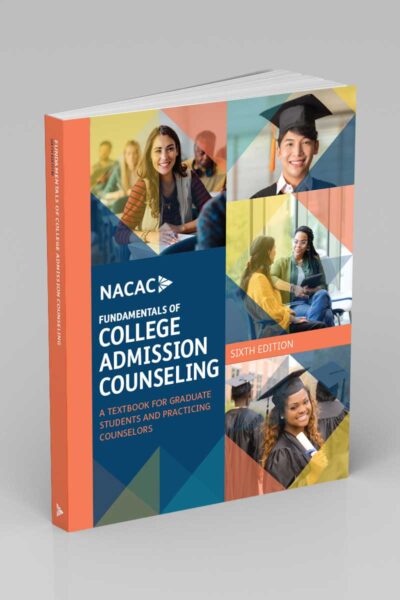Now Available! Order your copy of the all-new sixth edition of Fundamentals of College Admission Counseling here.
Learn more! NACAC hosted a webinar with our co-editors, Beth Gilfillan, Associate Professor at Northeastern Illinois University and Christopher Tremblay, Executive Director of Enrollment Management and Student Affairs, Taubman College of Architecture and Urban Planning at University of Michigan. During the session, we showcased the key features of the book and answered questions about using the book in your course.
For a deeper dive into the subjects covered in Fundamentals of College Admission Counseling, visit College Counseling for Specific Populations Courses
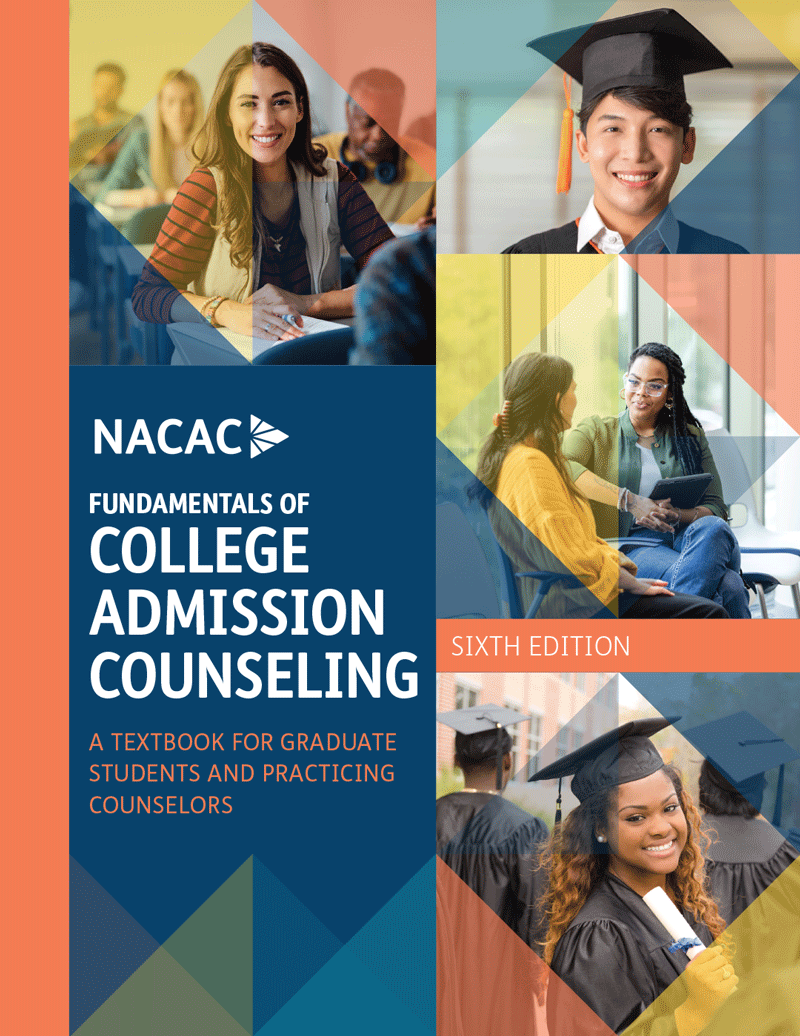
ISBN 978-0-9862863-2-2
NACAC introduces a completely revised sixth edition of Fundamentals of College Admission Counseling. In its revised sixth edition, this textbook provides school counseling and admission practitioners with essential knowledge and skills to comprehensively support students and their families in postsecondary planning and college enrollment. Additionally, this updated edition serves as the comprehensive classroom resource for graduate programs in school counseling, making it an essential resource for aspiring school counselors.
Pricing
- NACAC Member: $109.99
- Nonmember: $139.99
- Kindle: $149.99 (member and nonmember)
Prices include shipping and handling within the United States. International and expedited shipping charges are extra. Please contact Customerservice@nacacnet.org for rates.
“This book addresses all the essential elements of the profession. It’s an especially strong resource for understanding different population groups of students and their very distinct needs. Readers will learn about rural, international, LGBTQ+, people of color, first generation students, and so many others. It’s impressive how well this book details what school counselors need to know for various students at every academic level.”
— Bonnie M. Beyer, EdD; Professor Emerita of Educational Leadership; College of Education, Health, and Human Services; University of Michigan-Dearborn
What’s New in This Edition
- All-new lineup of distinguished authors featuring preeminent voices across the spectrum of college admission including:
- Leading academics,
- Practicing secondary school counselors,
- Post-secondary admissions leaders,
- Independent education consultants and
- Aligned industry experts
- Up-to-date content that addresses current issues in college admission counseling
- Concise, impactful chapters
- Faculty support materials
- Aligned with the CACREP standards
- Aligned with current school counseling training (e.g., ASCA National Model, MTSS, antiracist school counseling)
- An expanded special populations section
- Quick ways to find what you need including an index, keywords, chapter summaries and learning objectives
- Comprehensive reference list to enable further exploration
- Each chapter includes a resource list
- Case studies to facilitate deeper understanding and meaningful discussions
- Over 1,000 resources and references
Co-Editors
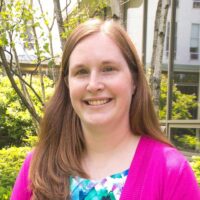 Dr. Beth H. Gilfillan is a dedicated educator and advocate in the field of school counseling. She holds a doctorate in Counselor Education & Supervision from The Pennsylvania State University, a master’s in Counseling from DePaul University, and a bachelor’s in Human Development and Psychological Services from Northwestern University. With a decade of experience as a high school counselor, specializing in post-secondary counseling, she transitioned to educating school counselors. She currently serves as an Assistant Professor of School Counseling at Northeastern Illinois University. Dr. Gilfillan is deeply engaged in professional development, providing training and support to school districts and school counselors nationwide on topics such as post-secondary counseling, college access, and utilizing data in school counseling. She is also a co-leader of the School Counseling Interest Network within ACES and the Postsecondary Affinity Group within ASCA. She served as President of the Illinois Association for College Admission Counseling in 2015-2016, and contributed two chapters to the fifth edition of NACAC’s Fundamentals textbook. In 2023, she was recognized as the Illinois School Counselor Educator of the Year. Currently, she directs a $4 million Department of Education grant supporting the training of school counseling students.
Dr. Beth H. Gilfillan is a dedicated educator and advocate in the field of school counseling. She holds a doctorate in Counselor Education & Supervision from The Pennsylvania State University, a master’s in Counseling from DePaul University, and a bachelor’s in Human Development and Psychological Services from Northwestern University. With a decade of experience as a high school counselor, specializing in post-secondary counseling, she transitioned to educating school counselors. She currently serves as an Assistant Professor of School Counseling at Northeastern Illinois University. Dr. Gilfillan is deeply engaged in professional development, providing training and support to school districts and school counselors nationwide on topics such as post-secondary counseling, college access, and utilizing data in school counseling. She is also a co-leader of the School Counseling Interest Network within ACES and the Postsecondary Affinity Group within ASCA. She served as President of the Illinois Association for College Admission Counseling in 2015-2016, and contributed two chapters to the fifth edition of NACAC’s Fundamentals textbook. In 2023, she was recognized as the Illinois School Counselor Educator of the Year. Currently, she directs a $4 million Department of Education grant supporting the training of school counseling students.
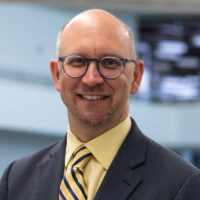 Christopher Tremblay, Ed.D. boasts three decades of leadership in higher education, having held pivotal roles at Western Michigan University, Gannon University, the University of Michigan-Dearborn, the University of Wisconsin-Superior, and Michigan State University, in addition to contributing to the Michigan College Access Network. Currently, he serves as the Executive Director of Enrollment Management and Student Affairs at the University of Michigan’s Taubman College of Architecture and Urban Planning. Tremblay holds a bachelor’s and master’s degree from Western Michigan University’s School of Communication, and a doctorate in educational leadership from the University of Michigan-Dearborn. With an extensive publication record, he has authored nearly 30 articles in various academic journals and presented at over 100 conferences globally. Tremblay co-founded the Journal of College Access and holds the position of editor-in-chief for AACRAO’s College & University Journal. Tremblay contributed chapters to the fourth and fifth editions of NACAC’s Fundamentals of College Admission Counseling.
Christopher Tremblay, Ed.D. boasts three decades of leadership in higher education, having held pivotal roles at Western Michigan University, Gannon University, the University of Michigan-Dearborn, the University of Wisconsin-Superior, and Michigan State University, in addition to contributing to the Michigan College Access Network. Currently, he serves as the Executive Director of Enrollment Management and Student Affairs at the University of Michigan’s Taubman College of Architecture and Urban Planning. Tremblay holds a bachelor’s and master’s degree from Western Michigan University’s School of Communication, and a doctorate in educational leadership from the University of Michigan-Dearborn. With an extensive publication record, he has authored nearly 30 articles in various academic journals and presented at over 100 conferences globally. Tremblay co-founded the Journal of College Access and holds the position of editor-in-chief for AACRAO’s College & University Journal. Tremblay contributed chapters to the fourth and fifth editions of NACAC’s Fundamentals of College Admission Counseling.Chapter Synopses and Author Info
Part 1
Three years after the COVID-19 pandemic, there are roughly 1 million fewer students enrolled in college. Despite the fact that bachelor’s degree holders generally earn more than those with just a high school diploma and have more job security, concerns over rising costs and large student loan balances are causing some to reconsider this option. A postpandemic resurgence in the demand for labor coupled with rising costs provoke the question: Is college worth it? This chapter will give an update on today’s landscape in hopes that every school counselor can answer that question with a resounding YES!

Kimberley Buster-Williams, EdD has three decades of experience in higher education and currently serves as the Associate Vice Provost for Student Success and Retention at The George Washington University (GW). In addition, Kimberley is a senior AACRAO consultant and serves as the assistant director of AACRAO’s SEM Endorsement Program (EP). Kimberley is a scholar-practitioner with an Ed.D. from Regent University. Her dissertation research examined employment engagement and succession planning in the context of retaining enrollment middle managers in the American “Big Quit,” “Great Reshuffle, and/or “Great Resignation” era. Kimberley holds an Ed.S. degree in Higher Education Administration, a master’s degree in Education Administration, and a bachelor’s degree in English, all from Old Dominion University. She also holds a postmaster’s certificate in leadership from the University of Michigan’s Center for the Education of Women. Lastly, Dr. Williams is the author of the 2021 book “History of American Higher Education A to Z: A Primer for Enrollment Managers.” She has published numerous articles focusing on student success and enrollment management.
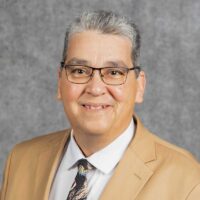 Rafael S. Figueroa, JD is Dean of College Guidance at Albuquerque Academy in New Mexico. He is a former admission officer at Occidental College in Los Angeles and Wesleyan University in Connecticut. He is a former President of the Rocky Mountain Association for College Admission Counseling. He has served on numerous committees for the National Association for College Admission Counseling, including the Ad Hoc Committee on Leadership, the Steering Committee on Admission Practices, and the Commission on the Use of Standardized Testing. He is a former Board Member of the Common Application and served on the Common Application Outreach Advisory Committee. He has a degree in American Studies from Stanford University and a J.D. degree from UCLA. He is a member of the California Bar.
Rafael S. Figueroa, JD is Dean of College Guidance at Albuquerque Academy in New Mexico. He is a former admission officer at Occidental College in Los Angeles and Wesleyan University in Connecticut. He is a former President of the Rocky Mountain Association for College Admission Counseling. He has served on numerous committees for the National Association for College Admission Counseling, including the Ad Hoc Committee on Leadership, the Steering Committee on Admission Practices, and the Commission on the Use of Standardized Testing. He is a former Board Member of the Common Application and served on the Common Application Outreach Advisory Committee. He has a degree in American Studies from Stanford University and a J.D. degree from UCLA. He is a member of the California Bar.
This chapter examines the importance of ethics as the foundation of the college admission counseling profession. It provides an introduction to ethics, traces the evolution of ethics within college admission, and discusses the ethical principles underlying college admission counseling.
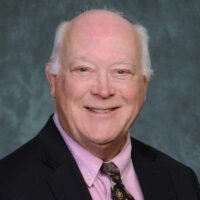 Jim Jump recently retired after 33 years as the Academic Dean and Director of College Counseling at St. Christopher’s School in Richmond, Virginia. He holds the BA degree from Randolph-Macon College and the MA in Philosophy from the University of Delaware. He previously served as an admissions officer, women’s basketball coach, and philosophy professor at the college level. Jim is a Past President of NACAC, and he writes the “Ethical College Admissions” column for Inside Higher Ed. He has been interviewed on NPR’s All Things Considered and quoted in publications ranging from the New York Times to Teen Vogue, and has been named a college admissions “influencer” by Forbes magazine. In addition, he is the recipient of NACAC’s 2024 John B. Muir Award for Excellence in Media.
Jim Jump recently retired after 33 years as the Academic Dean and Director of College Counseling at St. Christopher’s School in Richmond, Virginia. He holds the BA degree from Randolph-Macon College and the MA in Philosophy from the University of Delaware. He previously served as an admissions officer, women’s basketball coach, and philosophy professor at the college level. Jim is a Past President of NACAC, and he writes the “Ethical College Admissions” column for Inside Higher Ed. He has been interviewed on NPR’s All Things Considered and quoted in publications ranging from the New York Times to Teen Vogue, and has been named a college admissions “influencer” by Forbes magazine. In addition, he is the recipient of NACAC’s 2024 John B. Muir Award for Excellence in Media.
This chapter begins with a broad overview of legislation that has changed the landscape of whom higher education institutions have intended to serve since the 1960s. Then, it introduces the asset-based and critical studies frameworks that shape the practical applications of diversity, equity, inclusion, and belonging (DEIB) in the college access space. Then, culturally responsive practices are discussed, such as reflexive advising and recognizing intersectional student and family identities. The chapter also focuses on collective responsibility to consider community partners’ and other stakeholders’ shared investment and engagement in the college planning process. Finally, we end with a case study that models culturally responsive practices within a predominantly Latinx community in San Antonio, TX, and questions to consider as educators look to create more equitable and inclusive spaces.
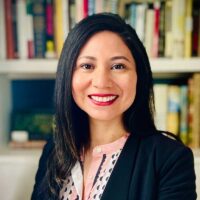 Carmen Serrata, PhD is an Assistant Professor in Higher Education at the University of North Carolina at Charlotte. She earned her Ph.D. in Educational Administration from the University of Texas at Austin and her Master’s in Educational Leadership and Policy Studies from the University of Texas at San Antonio. Her research centers on the postsecondary experiences of marginalized student populations and the influence of families along pathways to higher education. Carmen’s research and practice span the P-20 continuum and lean on asset-based theories and strategies for supporting students and engaging families in the educational journey.
Carmen Serrata, PhD is an Assistant Professor in Higher Education at the University of North Carolina at Charlotte. She earned her Ph.D. in Educational Administration from the University of Texas at Austin and her Master’s in Educational Leadership and Policy Studies from the University of Texas at San Antonio. Her research centers on the postsecondary experiences of marginalized student populations and the influence of families along pathways to higher education. Carmen’s research and practice span the P-20 continuum and lean on asset-based theories and strategies for supporting students and engaging families in the educational journey.
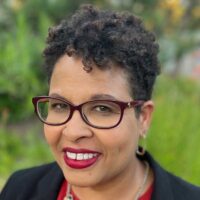 Simone Carnegie-Diaz, PhD has served in the field of college access for over twenty years. As a licensed Social Worker, immigrant, and first-generation college student, she passionately strives to assist students in overcoming class, social, academic, and cultural barriers to higher education. Moreover, she is committed to strengthening systems and dismantling barriers that stall educational equity. Ms. Carnegie-Diaz holds a BA in communication from Trinity University, a MA in speech communication from Texas A&M University, an MSW from the University of Houston, and a PhD in educational leadership from the University of Texas at San Antonio.
Simone Carnegie-Diaz, PhD has served in the field of college access for over twenty years. As a licensed Social Worker, immigrant, and first-generation college student, she passionately strives to assist students in overcoming class, social, academic, and cultural barriers to higher education. Moreover, she is committed to strengthening systems and dismantling barriers that stall educational equity. Ms. Carnegie-Diaz holds a BA in communication from Trinity University, a MA in speech communication from Texas A&M University, an MSW from the University of Houston, and a PhD in educational leadership from the University of Texas at San Antonio.
This chapter provides college counselors with a framework for employing developmental theories when supporting students through their college search process. Counselors are introduced to college choice theories, with particular attention to Hossler & Gallagher’s three-phase model. Within the prescribed phases of predisposition, search, and choice, we lift up how counselors may harness numerous developmental theories to facilitate students’ understanding of themselves, their goals, and capacity to achieve. Counselors are encouraged to understand the science guiding college readiness and ground their practice in the codified body of knowledge.
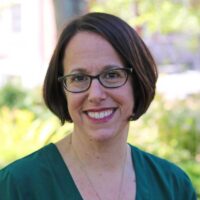 Mandy Savitz-Romer, PhD is the Nancy Pforzheimer Aronson Senior Lecturer in Human Development and Education at the Harvard Graduate School of Education (HGSE). She is also the faculty lead of the school counseling strand of the Human Development and Education program. She writes and speaks extensively on college and career readiness and school-based counseling, specially as it relates to students of color and first-generation college students. Dr. Savitz-Romer is the author of “Fulfilling the Promise: Reimagining School Counseling to Advance Student Success” and co-author of “Ready, Willing, and Able: A Developmental Approach to College Access and Success” and “Technology and Engagement: Making Technology Work for First-Generation College Students.” Dr. Savitz-Romer earned her PhD from Boston College and her Master’s degree in school counseling from Boston University.
Mandy Savitz-Romer, PhD is the Nancy Pforzheimer Aronson Senior Lecturer in Human Development and Education at the Harvard Graduate School of Education (HGSE). She is also the faculty lead of the school counseling strand of the Human Development and Education program. She writes and speaks extensively on college and career readiness and school-based counseling, specially as it relates to students of color and first-generation college students. Dr. Savitz-Romer is the author of “Fulfilling the Promise: Reimagining School Counseling to Advance Student Success” and co-author of “Ready, Willing, and Able: A Developmental Approach to College Access and Success” and “Technology and Engagement: Making Technology Work for First-Generation College Students.” Dr. Savitz-Romer earned her PhD from Boston College and her Master’s degree in school counseling from Boston University.
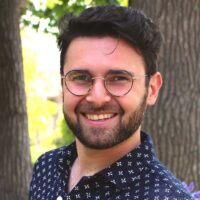
Julius DiLorenzo is an experienced admissions professional and recent graduate of Harvard’s Graduate School of Education. His research interests focus on increasing equity in the admissions process with particular attention to how school counselors and admissions officers are trained to produce and interpret application material. Outside of research, Julius serves as a first-year advisor to new undergraduates at Harvard College. Julius earned his B.A. in politics from Occidental College and his Ed.M. in education policy and analysis from HGSE.
Students have a wide array of learning opportunities available to them after high school. In addition, there are a number of factors to consider when choosing a learning path after high school, including the amount of time the student wants to devote to study, the cost of the learning experience, and the qualities, services, and programs the institution has to offer. This chapter offers an overview of the kinds of learning opportunities available and factors to consider when making a postsecondary choice.
 A past president of Michigan ACAC and the National Association for College Admission Counseling, Patrick J. O’Connor, PhD is Chief Strategist and CEO of College is Yours, a college advocacy and professional development organization. A college counselor since 1984 at both the high school and community college levels, Patrick is the author of the college guide College is Yours 3, and the school counselor book College Counseling for School Counselors. His weekly writing can also be found at High School Counselor Week, and sixoclocksky.com
A past president of Michigan ACAC and the National Association for College Admission Counseling, Patrick J. O’Connor, PhD is Chief Strategist and CEO of College is Yours, a college advocacy and professional development organization. A college counselor since 1984 at both the high school and community college levels, Patrick is the author of the college guide College is Yours 3, and the school counselor book College Counseling for School Counselors. His weekly writing can also be found at High School Counselor Week, and sixoclocksky.com
This chapter offers an introduction to the primary components of the undergraduate admission application. After providing a brief history of how application components have evolved, the chapter then delves into specific components that most commonly comprise the undergraduate admission application today, including the application form, personal essays, standardized test scores, letters of recommendation, and transcripts. Application components specific to particular student populations such as transfer and international applicants are also discussed. The chapter concludes by reflecting on the future of college admission application requirements.
 Sheena Ramirez, DMA has forged a unique hybrid career combining her two passions, higher education admissions and the visual and performing arts. Recognized as a thought leader in these fields, she has presented for national organizations such as the Alliance for the Arts in Research Universities (a2ru), the International Council of Fine Arts Deans (ICFAD), College Confidential and the College Board. Described as a “light, perky soprano” (New York Times), she was named “Best Female Voice” at the International Gilbert and Sullivan Festival among her accolades. As the Campus Experience Manager and CRM Specialist at Stevens Institute of Technology, she was recognized as the 2013 “Technology at our Core” Employee of the Year. She served as the Director of Recruitment for the College of Visual and Performing Arts at James Madison University. In her current role as the Senior Associate Dean of Admissions at Wake Forest University, she oversees operations, coordinates the file review process, and manages a team of admissions professionals. Sheena is a graduate of Oberlin Conservatory (BM), New England Conservatory (MM), and James Madison University (DMA).
Sheena Ramirez, DMA has forged a unique hybrid career combining her two passions, higher education admissions and the visual and performing arts. Recognized as a thought leader in these fields, she has presented for national organizations such as the Alliance for the Arts in Research Universities (a2ru), the International Council of Fine Arts Deans (ICFAD), College Confidential and the College Board. Described as a “light, perky soprano” (New York Times), she was named “Best Female Voice” at the International Gilbert and Sullivan Festival among her accolades. As the Campus Experience Manager and CRM Specialist at Stevens Institute of Technology, she was recognized as the 2013 “Technology at our Core” Employee of the Year. She served as the Director of Recruitment for the College of Visual and Performing Arts at James Madison University. In her current role as the Senior Associate Dean of Admissions at Wake Forest University, she oversees operations, coordinates the file review process, and manages a team of admissions professionals. Sheena is a graduate of Oberlin Conservatory (BM), New England Conservatory (MM), and James Madison University (DMA).
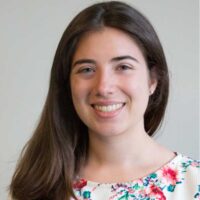 Tara P. Nicola, PhD is a Senior Consultant at Gallup and Visiting Scholar at Harvard University. Her research focuses on issues concerning access, choice, and equity in higher education, especially in relation to the college admission process. Her work has been featured in top education journals such as AERA Open, the Journal of Diversity in Higher Education, and Educational Policy, as well as media outlets such as Education Week, Inside Higher Ed, and The Hechinger Report. Tara holds a Ph.D. in Education from Harvard University, an Ed.M. in Education Policy and Management from the Harvard Graduate School of Education, a M.Sc. in Higher Education with Distinction from the University of Oxford, and a B.A. in English from Johns Hopkins University.
Tara P. Nicola, PhD is a Senior Consultant at Gallup and Visiting Scholar at Harvard University. Her research focuses on issues concerning access, choice, and equity in higher education, especially in relation to the college admission process. Her work has been featured in top education journals such as AERA Open, the Journal of Diversity in Higher Education, and Educational Policy, as well as media outlets such as Education Week, Inside Higher Ed, and The Hechinger Report. Tara holds a Ph.D. in Education from Harvard University, an Ed.M. in Education Policy and Management from the Harvard Graduate School of Education, a M.Sc. in Higher Education with Distinction from the University of Oxford, and a B.A. in English from Johns Hopkins University.
This chapter provides an overview of how institutions use different pieces of the college application, from academic components to non-academic components, like extracurricular activities and leadership roles. While each institution is unique and approaches admissions through the lens of its strategic vision and mission, there are commonalities among many institutions that this chapter elucidates. The goal of this chapter is to provide an overview of how the admission decision process works, but is not meant to replace the knowledge or expertise of a given institution or high school counselor.
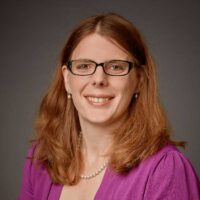 Amy C. Hutton, PhD is the Associate Vice Chancellor for Enrollment Management at the University of Colorado Boulder, where she oversees admissions, business solutions, the bursar, financial aid, marketing, and precollege programs. Prior to joining CU Boulder, Dr. Hutton was the Assistant Vice President for Enrollment Management at The University of Alabama, where she oversaw Admissions, Recruitment, Marketing, and Orientation. Dr. Hutton also previously served as a professor of statistics, professor of theatre, director of admissions, and director of enrollment research at Virginia Commonwealth University. Her research centers around effectively leveraging qualitative and quantitative research to strengthen admissions and student success in higher education. Her work has been featured in many textbooks and peer-reviewed journals. Her expertise in storytelling from her work on Broadway combined with her extensive training in statistics and research provides a unique lens for evaluating the efficacy of Strategic Enrollment Management work and driving innovation in the profession. Dr. Hutton received her Bachelor of Musical Arts, double majoring in Music and Communications, from DePauw University and her Master of Fine Arts in Theatre Pedagogy and Ph.D. in Education: Research and Evaluation from Virginia Commonwealth University.
Amy C. Hutton, PhD is the Associate Vice Chancellor for Enrollment Management at the University of Colorado Boulder, where she oversees admissions, business solutions, the bursar, financial aid, marketing, and precollege programs. Prior to joining CU Boulder, Dr. Hutton was the Assistant Vice President for Enrollment Management at The University of Alabama, where she oversaw Admissions, Recruitment, Marketing, and Orientation. Dr. Hutton also previously served as a professor of statistics, professor of theatre, director of admissions, and director of enrollment research at Virginia Commonwealth University. Her research centers around effectively leveraging qualitative and quantitative research to strengthen admissions and student success in higher education. Her work has been featured in many textbooks and peer-reviewed journals. Her expertise in storytelling from her work on Broadway combined with her extensive training in statistics and research provides a unique lens for evaluating the efficacy of Strategic Enrollment Management work and driving innovation in the profession. Dr. Hutton received her Bachelor of Musical Arts, double majoring in Music and Communications, from DePauw University and her Master of Fine Arts in Theatre Pedagogy and Ph.D. in Education: Research and Evaluation from Virginia Commonwealth University.
This chapter offers information on creating a college-going culture within your school site to create your comprehensive college counseling program. To create this culture, school counselors need to facilitate early college awareness, understand the role of pre-college programming, and create relationships with college professionals. This chapter will provide various resources so school counselors can be best informed in order to help students and families understand the steps of the process for researching, applying to, and deciding on a postsecondary college plan.
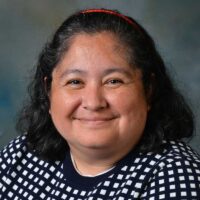 Maritza Cha, PhD graduated from Garfield High School in East Los Angeles and became the first in her family to attend and graduate from college, the University of California, Los Angeles. She graduated in 2005 with two Bachelor’s Degrees in Political Science and History, with a minor in Education. UCLA was so nice she went there twice, earning a Master’s Degree in Education, as well as a teaching credential, from UCLA’s Teacher Education Program in 2007. She taught social studies at her alma mater, Garfield High School for 4 years. In 2010, Dr. Cha and several colleagues designed and launched a pilot school within the Los Angeles Unified School District – Social Justice Leadership Academy at Esteban Torres High School. Dr. Cha then decided to work towards her lifelong dream of becoming a college counselor. Dr. Cha earned her second Master’s Degree, a counseling credential and child welfare and attendance credential, from Cal State Dominguez Hills in 2015. Dr. Cha worked as a school counselor for 8 years. Dr. Cha earned her PhD at Claremont Graduate University in Education, Urban Leadership. Dr. Cha has presented about school counseling topics at the national, state and local level including ASCA, CASC, WACAC, NACAC and AERA. Dr. Cha co-authored a book chapter named “Servant Leadership: School Counseling During the Pandemic.” Dr. Maritza Cha currently is a National School Counselor Fellow and part of the Professional School Counseling Emerging Scholars Fellow Program.
Maritza Cha, PhD graduated from Garfield High School in East Los Angeles and became the first in her family to attend and graduate from college, the University of California, Los Angeles. She graduated in 2005 with two Bachelor’s Degrees in Political Science and History, with a minor in Education. UCLA was so nice she went there twice, earning a Master’s Degree in Education, as well as a teaching credential, from UCLA’s Teacher Education Program in 2007. She taught social studies at her alma mater, Garfield High School for 4 years. In 2010, Dr. Cha and several colleagues designed and launched a pilot school within the Los Angeles Unified School District – Social Justice Leadership Academy at Esteban Torres High School. Dr. Cha then decided to work towards her lifelong dream of becoming a college counselor. Dr. Cha earned her second Master’s Degree, a counseling credential and child welfare and attendance credential, from Cal State Dominguez Hills in 2015. Dr. Cha worked as a school counselor for 8 years. Dr. Cha earned her PhD at Claremont Graduate University in Education, Urban Leadership. Dr. Cha has presented about school counseling topics at the national, state and local level including ASCA, CASC, WACAC, NACAC and AERA. Dr. Cha co-authored a book chapter named “Servant Leadership: School Counseling During the Pandemic.” Dr. Maritza Cha currently is a National School Counselor Fellow and part of the Professional School Counseling Emerging Scholars Fellow Program.
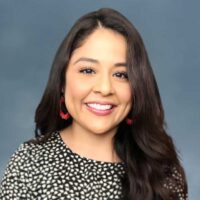 Andrea Perez is a first-generation Latina from Maywood, California. She works as a counselor at Los Angeles Unified School District. Perez is committed to supporting and empowering students and families. Perez holds a bachelor’s degree from the University of California, Los Angeles; a master’s degree in Counseling, and a Pupil Personnel Services Credential from California State University in Long Beach; and she is a Ph.D. Candidate at Claremont Graduate University. Her research interests include: the school counselor’s role in the Multi-Tiered, Multi-Domained system of support; social justice counseling practices in schools; culturally responsive practices and its use in K-12 settings; and students’ social and academic development. As a scholar-practitioner, Perez has co-authored chapters and articles and she has presented on her research at local, state, and national conferences.
Andrea Perez is a first-generation Latina from Maywood, California. She works as a counselor at Los Angeles Unified School District. Perez is committed to supporting and empowering students and families. Perez holds a bachelor’s degree from the University of California, Los Angeles; a master’s degree in Counseling, and a Pupil Personnel Services Credential from California State University in Long Beach; and she is a Ph.D. Candidate at Claremont Graduate University. Her research interests include: the school counselor’s role in the Multi-Tiered, Multi-Domained system of support; social justice counseling practices in schools; culturally responsive practices and its use in K-12 settings; and students’ social and academic development. As a scholar-practitioner, Perez has co-authored chapters and articles and she has presented on her research at local, state, and national conferences.
This chapter provides an overview of key historical aspects of school counseling and the movement toward college and career counseling, legislation, and its impacts on school counseling, the 2024 CACREP Standards, the ASCA National Model and additional resources, and a review of college and career counseling within the context of the multi-tiered system of supports.
 Jennifer N. Kirk, EdD is in her 13th year as a School Counseling Curriculum Leader. She also served as a K-12, Middle and High School Counselor over the last 25 years. Kirk is a consultant with Counselors for Computing – National Center for Women and Information Technology, NPR, MindShift, K-12 Dive and PublicSource. She was featured on the NBC Nightly News series “Checking in on America’s high schools in this unprecedented year” throughout the 2020-2021 school year. Kirk has served in various leadership roles; Board Chair and Secretary of PSCA, committee member with PACAC and NACAC, committee member and board director with PASAP. Kirk has presented locally, statewide and nationally on topics including college and career readiness, leadership, LGBTQ+, advocacy, mentorship and consultation, mental health and more. She has and continues to work diligently to advocate for all students and create inclusive environments to allow all students access to positive outcomes. Kirk was awarded the 2014 PSCA High School Counselor of the year, 2018 Duquesne University Counseling Supervisor of the Year, and was a 2019 College Board Recognized Counselor.
Jennifer N. Kirk, EdD is in her 13th year as a School Counseling Curriculum Leader. She also served as a K-12, Middle and High School Counselor over the last 25 years. Kirk is a consultant with Counselors for Computing – National Center for Women and Information Technology, NPR, MindShift, K-12 Dive and PublicSource. She was featured on the NBC Nightly News series “Checking in on America’s high schools in this unprecedented year” throughout the 2020-2021 school year. Kirk has served in various leadership roles; Board Chair and Secretary of PSCA, committee member with PACAC and NACAC, committee member and board director with PASAP. Kirk has presented locally, statewide and nationally on topics including college and career readiness, leadership, LGBTQ+, advocacy, mentorship and consultation, mental health and more. She has and continues to work diligently to advocate for all students and create inclusive environments to allow all students access to positive outcomes. Kirk was awarded the 2014 PSCA High School Counselor of the year, 2018 Duquesne University Counseling Supervisor of the Year, and was a 2019 College Board Recognized Counselor.
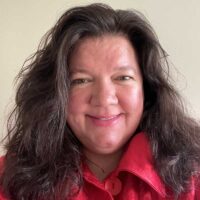 Karen Rubican is the School Counselor Advisor for the Pennsylvania Department of Education. A licensed professional counselor holding national board certification, her undergraduate degree is in Psychology from California University of PA; she holds master’s degrees in Community Counseling Services and K-12 Education Administration, as well as K-12 School Counseling and Advanced Graduate Studies certifications from Duquesne University. Her career began working for Allegheny County Department of Human Services, then coordinated the Court-Teams grant for ZERO TO THREE/Allegheny County Children’s Court, and the College/Career Counseling grant for Woodland Hills School District, which culminated in recognition as the outstanding multi-level career development program by the Pennsylvania School Counselor Association. Karen began working at Canon-McMillan High School in 2009 and oversaw postsecondary, career, scholarships, National Merit, school counselor communications and more while directly supporting a caseload of approximately 400 students. Recognized as the 2018 Secondary School Counselor of the Year by PSCA, she was a finalist for the AASA Women in School Leader award in 2018.
Karen Rubican is the School Counselor Advisor for the Pennsylvania Department of Education. A licensed professional counselor holding national board certification, her undergraduate degree is in Psychology from California University of PA; she holds master’s degrees in Community Counseling Services and K-12 Education Administration, as well as K-12 School Counseling and Advanced Graduate Studies certifications from Duquesne University. Her career began working for Allegheny County Department of Human Services, then coordinated the Court-Teams grant for ZERO TO THREE/Allegheny County Children’s Court, and the College/Career Counseling grant for Woodland Hills School District, which culminated in recognition as the outstanding multi-level career development program by the Pennsylvania School Counselor Association. Karen began working at Canon-McMillan High School in 2009 and oversaw postsecondary, career, scholarships, National Merit, school counselor communications and more while directly supporting a caseload of approximately 400 students. Recognized as the 2018 Secondary School Counselor of the Year by PSCA, she was a finalist for the AASA Women in School Leader award in 2018.
This chapter introduces how to use data to support and evaluate school counseling programs specifically geared toward expanding and measuring college and career readiness. Ideas for incorporating evidence-based, data-driven practices and planning are offered. Emphasis is given to designing policies and practices that promote equity.
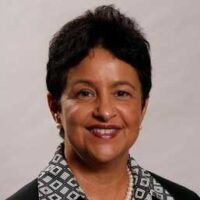 Esther B. Hugo, EdD is a Past-President of the Western Association for College Admission Counseling and is an adjunct professor at the San Jose State University College of Education. She works as a Distinguished Faculty in the UCLA College Counseling Certificate Program and is the Co-Director of the award-winning District Directions program. A School Board member of the Making Waves Charter Academy which serves low-income and first-generation college students, Esther represents the School Board to the WASC Accreditation Committee and the Curriculum Committee. Prior to Esther worked as the Outreach Coordinator at Santa Monica College and as the College Counselor at Westchester High School. Esther has authored a chapter in the NACAC Fundamentals textbook and recently published an article in the Winter 2023 edition of the Journal of College Admission, “Reengaging College-Bound Students Amid the Pandemic’s Aftermath.”
Esther B. Hugo, EdD is a Past-President of the Western Association for College Admission Counseling and is an adjunct professor at the San Jose State University College of Education. She works as a Distinguished Faculty in the UCLA College Counseling Certificate Program and is the Co-Director of the award-winning District Directions program. A School Board member of the Making Waves Charter Academy which serves low-income and first-generation college students, Esther represents the School Board to the WASC Accreditation Committee and the Curriculum Committee. Prior to Esther worked as the Outreach Coordinator at Santa Monica College and as the College Counselor at Westchester High School. Esther has authored a chapter in the NACAC Fundamentals textbook and recently published an article in the Winter 2023 edition of the Journal of College Admission, “Reengaging College-Bound Students Amid the Pandemic’s Aftermath.”
 Catalina Cifuentes, MA is a passionate educator and fierce advocate who has demonstrated the power behind effective school counseling, college affordability, and higher education advocacy on behalf of all students. She is currently the Executive Director of College and Career Readiness for the Riverside County Office of Education and is a California governor-appointed Commissioner and Chair for the California Student Aid Commission and Cradle to Career Board Member. Cifuentes also serves on various regional, state, and national committees to have a voice in the decisions that affect our student’s access to a quality education and a promising future. She was also the recipient of the 2018 Western Association for College Admissions Counseling Joe Allen Human Relations Award, the 2018 National Association of College Admission Counseling Inclusion, Access, and Success Award and the 2019 Riverside County Office of Education Administrator of the Year. As a firs college graduate, Cifuentes strives to show the impact that can be made when educators have high expectations for all students and when students pursue their post-secondary dreams regardless of the odds against them.
Catalina Cifuentes, MA is a passionate educator and fierce advocate who has demonstrated the power behind effective school counseling, college affordability, and higher education advocacy on behalf of all students. She is currently the Executive Director of College and Career Readiness for the Riverside County Office of Education and is a California governor-appointed Commissioner and Chair for the California Student Aid Commission and Cradle to Career Board Member. Cifuentes also serves on various regional, state, and national committees to have a voice in the decisions that affect our student’s access to a quality education and a promising future. She was also the recipient of the 2018 Western Association for College Admissions Counseling Joe Allen Human Relations Award, the 2018 National Association of College Admission Counseling Inclusion, Access, and Success Award and the 2019 Riverside County Office of Education Administrator of the Year. As a firs college graduate, Cifuentes strives to show the impact that can be made when educators have high expectations for all students and when students pursue their post-secondary dreams regardless of the odds against them.
The use of technology has increasingly become a required skill in school counseling, especially when assisting in the college admissions process. As a result of COVID-19, there was an increased shift in the use of technology in supporting college admissions. Technology is needed to facilitate every aspect of this process including college research, exploration, required assessments, application materials, as well as the use of social media and artificial intelligence. School counselors also need technology to track and assess data. Additionally, the role of research and continued professional development in facilitating the use of technology for college admissions counseling is identified and explored.
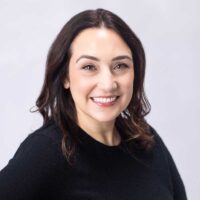 Christine M. Enrico, EdD is currently a district school counseling supervisor in Paramus, NJ. Her doctoral work focused on technology’s role in the college admissions process, school counselors’ use of technology, and the need for continued ongoing professional development. Her experience includes educational planning, school use of technology, assessment, staff professional development, and many aspects of college and career planning. As a school counselor, she has had the pleasure of assisting students in grades 9-12 and overseeing alternate education and adult high school students as they navigate through their secondary and postsecondary academic life. Dr. Enrico is an inaugural fellow as part of San Diego State University’s Center for Equity and Postsecondary Attainment National School Counselor Fellowship which focuses on applying a practice-based approach to address the pandemic’s impact on student’s educational pathways.
Christine M. Enrico, EdD is currently a district school counseling supervisor in Paramus, NJ. Her doctoral work focused on technology’s role in the college admissions process, school counselors’ use of technology, and the need for continued ongoing professional development. Her experience includes educational planning, school use of technology, assessment, staff professional development, and many aspects of college and career planning. As a school counselor, she has had the pleasure of assisting students in grades 9-12 and overseeing alternate education and adult high school students as they navigate through their secondary and postsecondary academic life. Dr. Enrico is an inaugural fellow as part of San Diego State University’s Center for Equity and Postsecondary Attainment National School Counselor Fellowship which focuses on applying a practice-based approach to address the pandemic’s impact on student’s educational pathways.
This chapter provides a general overview of the financial aid process, covers some of the major forms, applications, and processes, and provides some definitions of terms. The goal is to provide an understanding of the many programs available to students, such as Pell Grants, state grants, loans, and scholarships. The world of student financial aid is vast, and it is impossible to cover all its areas, but this chapter provides a starting point for exploring this information and offers information currently available on the changes that are occurring in financial aid processing and programs, with resources for additional reading.
 Karina Diaz is currently a Financial Aid Administrator at DePaul University. She has worked in Financial Aid for over ten years in a variety of roles. The most enjoyable part of the financial aid process is that it exposes the interconnected workings of higher education. She is a first-generation student currently pursuing a Ph.D. in English at Northern Illinois University, where she also teaches writing. Her area of study may seem unrelated to her work as a financial aid administrator, but the skills obtained through her degrees allow her to decipher and analyze different pathways towards financial literacy and deliver the necessary tools for students to gain control over their educational options. By working with students, she has helped demystify the process not just for herself, but for many families like hers and unlike hers with the same passion that she writes this chapter. She endeavors to share her experience and knowledge while continuing to be a resource for students, families, and colleagues in higher education as the world shifts and changes.
Karina Diaz is currently a Financial Aid Administrator at DePaul University. She has worked in Financial Aid for over ten years in a variety of roles. The most enjoyable part of the financial aid process is that it exposes the interconnected workings of higher education. She is a first-generation student currently pursuing a Ph.D. in English at Northern Illinois University, where she also teaches writing. Her area of study may seem unrelated to her work as a financial aid administrator, but the skills obtained through her degrees allow her to decipher and analyze different pathways towards financial literacy and deliver the necessary tools for students to gain control over their educational options. By working with students, she has helped demystify the process not just for herself, but for many families like hers and unlike hers with the same passion that she writes this chapter. She endeavors to share her experience and knowledge while continuing to be a resource for students, families, and colleagues in higher education as the world shifts and changes.
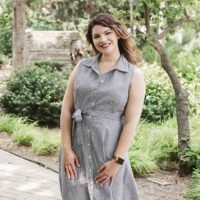 Dominique Rodriguez, MEd serves as an Assistant Director of Financial Aid and the School Certifying Official at Dominican University, effective June 2023. Here, she serves undergraduate, graduate, post-bac, certificate, and veteran students. Prior to her employment here, she served as a Financial Aid Counselor with DePaul University for eight years. There, she served undergraduate, graduate, and professional students. She earned a Master’s in Education in Counseling, College Counseling and Student Affairs in June 2023. As a first-generation college student, she knew the challenges of navigating financial aid. Her experience informs her work to students enrolled in higher education. Using person-centered, holistic counseling to support students’ retention and persistence to graduation and program completion, she leverages her knowledge, expertise, and connections to support her students’ goals. Dominique’s mission is to guide students through their higher education journey with grace, care, and virtue. Dominique grounds her work in the pursuit of honesty, truth, and duty to provide resources to her students and to connect students to other resources that they may need in their journeys.
Dominique Rodriguez, MEd serves as an Assistant Director of Financial Aid and the School Certifying Official at Dominican University, effective June 2023. Here, she serves undergraduate, graduate, post-bac, certificate, and veteran students. Prior to her employment here, she served as a Financial Aid Counselor with DePaul University for eight years. There, she served undergraduate, graduate, and professional students. She earned a Master’s in Education in Counseling, College Counseling and Student Affairs in June 2023. As a first-generation college student, she knew the challenges of navigating financial aid. Her experience informs her work to students enrolled in higher education. Using person-centered, holistic counseling to support students’ retention and persistence to graduation and program completion, she leverages her knowledge, expertise, and connections to support her students’ goals. Dominique’s mission is to guide students through their higher education journey with grace, care, and virtue. Dominique grounds her work in the pursuit of honesty, truth, and duty to provide resources to her students and to connect students to other resources that they may need in their journeys.
Part 2: Specific Population Features
First-generation college students (FGCS), those students whose parents and guardians do not have a bachelor’s degree, have unique experiences, strengths, and challenges in their college admissions journey. School counselors can support FGCS through intentional, holistic programming, including involving families, working to navigate financial hurdles, and collaborating with community-based organizations and institutions of higher education. We also must celebrate the milestones FGCS achieve by being the first in their family to attend college.
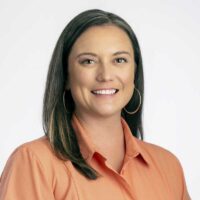 Dana L. Brookover is an Assistant Professor in the Department of Education and Counseling at Villanova University. Dr. Brookover was previously a school counselor, in both Virginia and Philadelphia, and made the transition to teaching graduate students after earning her PhD in Counselor Education and Supervision from Virginia Commonwealth University in 2020. Her research focuses on equitable college and career readiness, as well as social determinants of health.
Dana L. Brookover is an Assistant Professor in the Department of Education and Counseling at Villanova University. Dr. Brookover was previously a school counselor, in both Virginia and Philadelphia, and made the transition to teaching graduate students after earning her PhD in Counselor Education and Supervision from Virginia Commonwealth University in 2020. Her research focuses on equitable college and career readiness, as well as social determinants of health.
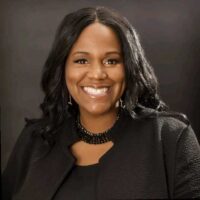 Cicily Shaw is the Co-Director of College Counseling and has worked in higher education and at the secondary school level for over 25 years. Prior to joining Thayer in 2022, she was the Founding Director of College Counseling at Boston Trinity Academy for 18 years. Cicily has also worked in college admission at Boston College, Bryant University, and Lesley University. As a first-generation college student, Cicily’s love for college access has fueled her passion to give back professionally and she has been an active member and leader in NACAC (National Association for College Admission Counseling) and NEACAC (New England Association for College Admission Counseling). Cicily has a M.Div. from Boston University, MS in Counseling from Northeastern University, a BA in HealthCare Administration from Stonehill College and is currently pursuing her doctoral degree in Educational Leadership at Northeastern University. Cicily is a Massachusetts native who grew up on the South Shore. Cicily and her husband are active members in their church community as ordained ministers, she volunteers her time as a mentor to young women, and serves on several college access committees.
Cicily Shaw is the Co-Director of College Counseling and has worked in higher education and at the secondary school level for over 25 years. Prior to joining Thayer in 2022, she was the Founding Director of College Counseling at Boston Trinity Academy for 18 years. Cicily has also worked in college admission at Boston College, Bryant University, and Lesley University. As a first-generation college student, Cicily’s love for college access has fueled her passion to give back professionally and she has been an active member and leader in NACAC (National Association for College Admission Counseling) and NEACAC (New England Association for College Admission Counseling). Cicily has a M.Div. from Boston University, MS in Counseling from Northeastern University, a BA in HealthCare Administration from Stonehill College and is currently pursuing her doctoral degree in Educational Leadership at Northeastern University. Cicily is a Massachusetts native who grew up on the South Shore. Cicily and her husband are active members in their church community as ordained ministers, she volunteers her time as a mentor to young women, and serves on several college access committees.
In this mini chapter, the focus is on international students seeking admission to American universities. It delves into the diverse backgrounds of these applicants and explores the unique challenges they face in navigating the application process from abroad. The chapter provides a comprehensive overview of application and visa requirements, while also taking into account things like standardized testing and financial considerations. Moreover, it offers practical guidance on cultivating resilience and preparing students for the transformative experience of college life abroad. This serves as a roadmap for educators helping students who are aspiring to study in the United States.
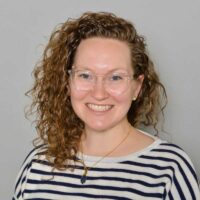 Monica Gallego Rude, EdD is a college counselor and the founder of Apply Broadly. She holds a B.A. in History and Educational Studies from Washington University in St. Louis and an Ed.D. from the UCL Institute of Education. Monica has worked in international admissions and with globally mobile families for significantly longer than she’d like to admit. Prior to returning to the United States, she lived and worked in Asia and Europe – and successfully guided hundreds of students through the college process. Having worked on both sides of the desk, Monica’s superpower is “translating” admissions systems for students and their families.
Monica Gallego Rude, EdD is a college counselor and the founder of Apply Broadly. She holds a B.A. in History and Educational Studies from Washington University in St. Louis and an Ed.D. from the UCL Institute of Education. Monica has worked in international admissions and with globally mobile families for significantly longer than she’d like to admit. Prior to returning to the United States, she lived and worked in Asia and Europe – and successfully guided hundreds of students through the college process. Having worked on both sides of the desk, Monica’s superpower is “translating” admissions systems for students and their families.
LGBTQ+ youth represent a wide range of identities and identifiers, backgrounds, home contexts, and socioeconomic statuses, and they are in different places in their journeys of self-discovery. In full view, it may seem they have nothing in common. However, they all experience a unique college search with considerations specific to LGBTQ+ students.
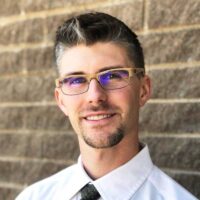 Robert Powers, MA is an independent educational consultant (IEC) who specializes in helping LGBTQ+ teens discover and access safe, happy, supportive colleges. Robert is the founder and college counselor at College Torch, an educational consultancy in Sierra Madre, CA, where more than 50% of his students identify as LGBTQ+. College Torch is a 2023 recipient of the National Pride Grant and works actively to provide resources and support to LGBTQ+ teens across the country. Robert is an active advocate for the LGBTQ+ community. In March 2023, Robert co-founded the IECs for Human Rights organization with Carolyn Caplan. The group leads letter-writing campaigns, educates colleagues and the public about issues facing LGBTQ+ students, and guides leaders in the IEC profession to include LGBTQ+ rights in their programming. Robert received his B.A. and M.A. degrees concurrently from Johns Hopkins University. He is a member of multiple professional organizations (IECA, HECA, NACAC, WACAC), and he is active in the Coca-Cola Scholars community as a scholar coach, application reader (2019-2021), and 2007 scholar.
Robert Powers, MA is an independent educational consultant (IEC) who specializes in helping LGBTQ+ teens discover and access safe, happy, supportive colleges. Robert is the founder and college counselor at College Torch, an educational consultancy in Sierra Madre, CA, where more than 50% of his students identify as LGBTQ+. College Torch is a 2023 recipient of the National Pride Grant and works actively to provide resources and support to LGBTQ+ teens across the country. Robert is an active advocate for the LGBTQ+ community. In March 2023, Robert co-founded the IECs for Human Rights organization with Carolyn Caplan. The group leads letter-writing campaigns, educates colleagues and the public about issues facing LGBTQ+ students, and guides leaders in the IEC profession to include LGBTQ+ rights in their programming. Robert received his B.A. and M.A. degrees concurrently from Johns Hopkins University. He is a member of multiple professional organizations (IECA, HECA, NACAC, WACAC), and he is active in the Coca-Cola Scholars community as a scholar coach, application reader (2019-2021), and 2007 scholar.
Tammy R. Johnson, EdD, serves as Executive Director of Doctoral Programs and Assistant Professor of Leadership Studies in the CoEPD at Marshall University. Prior to this appointment, she served as AVP of Enrollment and Dean of Admissions at Marshall, with oversight of UG, graduate, and international admissions, as well as immigration, international student services, and student financial aid. Dr. Johnson is a current AACRAO national caucus Co-Chair and has twice served as chair of the national AACRAO Admissions Policies and Practices Committee. She has presented at state, regional, and national conferences, including AACRAO, WVACRAO, NAFSA, NASPA, WVASPA and AESA. Her areas of research interest include higher education administration, leadership, and issues related to equity and access for historically underserved and/or marginalized populations. Dr. Johnson’s previously published work appears in The Chronicle of Higher Education, AACRAO SEM, NASPA and AACRAO-sponsored books and, most recently, in College and University Journal (2023). She holds earned degrees from The University of Charleston (B.S.), Texas Woman’s University (M.Ed.), and Marshall University (Ed.D.).
This chapter describes the characteristics of military connected students and their success in higher education. The educational aspirations and enrollment patterns of military connected students are also explored. This chapter leverages Schlossberg’s Transition Theory to apply strategies for enhancing student success. It also examines some of the common challenges military connected students experience in the transition to higher education, as well as the many support resources that can enhance their success.
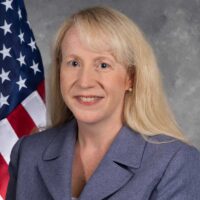 Tara Hornor, PhD currently serves as Professor and Coordinator of Higher Education Leadership programs in The Citadel’s Zucker Family School of Education. Her professional background includes experience in a variety of administrative positions in higher education including service as an associate provost and leadership positions in academic affairs, student affairs, enrollment management, and institutional research. Hornor holds a Ph.D. in Higher Education Administration from the University of Arizona and master’s degrees in school counseling, instructional design, and human resource management.
Tara Hornor, PhD currently serves as Professor and Coordinator of Higher Education Leadership programs in The Citadel’s Zucker Family School of Education. Her professional background includes experience in a variety of administrative positions in higher education including service as an associate provost and leadership positions in academic affairs, student affairs, enrollment management, and institutional research. Hornor holds a Ph.D. in Higher Education Administration from the University of Arizona and master’s degrees in school counseling, instructional design, and human resource management.
The chapter introduces the population of multilingual learners (MLs). It provides an overview of their educational rights as well as their K–12 experiences. This chapter details the many systemic barriers MLs encounter throughout their K–12 education that inhibit their ability to become college-and-career ready. Barriers include the lack of opportunities to enroll in grade-level curricula, advanced coursework, as well as extracurriculars that facilitate their career exploration. There are several interventions school counselors can implement in collaboration with administrators, teachers, and family members.
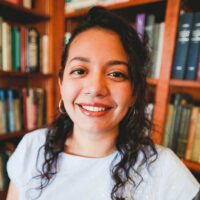 Sophia L. Ángeles, PhD is an Assistant Professor of Multilingual Education for the College of Education at Penn State University. She earned her Ph.D. from the School of Education and Information Studies at the University of California, Los Angeles. Stemming from her experiences as a former educator working in multilingual and immigrant communities, Dr. Ángeles’ interrogates how and why language programs are designed in ways that translate into differential access to college and career readiness opportunities for high school newcomer youth. Her scholarship also accounts for how newcomer youth’s educational trajectories are shaped by immigration policies and their identities as minoritized youth.
Sophia L. Ángeles, PhD is an Assistant Professor of Multilingual Education for the College of Education at Penn State University. She earned her Ph.D. from the School of Education and Information Studies at the University of California, Los Angeles. Stemming from her experiences as a former educator working in multilingual and immigrant communities, Dr. Ángeles’ interrogates how and why language programs are designed in ways that translate into differential access to college and career readiness opportunities for high school newcomer youth. Her scholarship also accounts for how newcomer youth’s educational trajectories are shaped by immigration policies and their identities as minoritized youth.
This chapter includes a description of the prevalence of students experiencing homelessness in schools, the challenges of homelessness on families and youth, and the McKinney-Vento Homeless Assistance Act. Strategies for working with students experiencing homelessness going to college, as well as a discussion about partners with whom counselors can collaborate are described. The role of school counselors and other key educational staff supporting the college preparation of youth experiencing homelessness is highlighted.
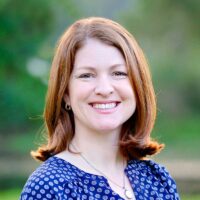 Stacey A. Havlik, PhD is an associate professor at Villanova University where she teaches graduate and undergraduate level courses in the Counseling Program. As a former school counselor, Dr. Havlik specializes in training pre-service school counselors and other school personnel to be leaders and advocates in meeting the diverse needs of all students. Her research interests include investigating the academic, social/emotional, and career/college developmental needs of students experiencing homelessness and first-generation college students. Dr. Havlik has presented and published this work nationally and internationally. She is a consultant for the National Association for the Education of Homeless Children and Youth (NAEHCY) Single Point of Contact (SPOC) Program where she is a member of their higher education committee. In this role, she works collaboratively with committee members to provide professional development and gather data on how high schools and colleges can better prepare students experiencing homelessness for college.
Stacey A. Havlik, PhD is an associate professor at Villanova University where she teaches graduate and undergraduate level courses in the Counseling Program. As a former school counselor, Dr. Havlik specializes in training pre-service school counselors and other school personnel to be leaders and advocates in meeting the diverse needs of all students. Her research interests include investigating the academic, social/emotional, and career/college developmental needs of students experiencing homelessness and first-generation college students. Dr. Havlik has presented and published this work nationally and internationally. She is a consultant for the National Association for the Education of Homeless Children and Youth (NAEHCY) Single Point of Contact (SPOC) Program where she is a member of their higher education committee. In this role, she works collaboratively with committee members to provide professional development and gather data on how high schools and colleges can better prepare students experiencing homelessness for college.
Students from lower socioeconomic backgrounds have various experiences with access to opportunities, resources, and support systems, which can greatly affect their academic performance, educational aspirations, and overall well-being. The chapter begins by defining socioeconomic status (SES) to serve as the foundation for the subsequent discussions about SES status, postsecondary data, current challenges, and intersectionality. Furthermore, the chapter explores the influence of community, self-efficacy, and aspirations on students from these backgrounds. It also examines the experiences of this student subgroup and offers resources and asset-based practices to better prepare practitioners on ways to support these students through postsecondary education.
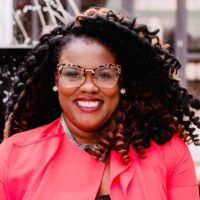 Chantelle George, PhD, is a native of Lafayette, Louisiana. She is currently the founder and CEO of CG Consulting, a Black, female-owned and operated consulting firm that supports entities focused on postsecondary equity. To date, CG Consulting has an impact of over 10 states and 100,000 students. Chantelle brings more than 13 years of college access and success experience in the areas of K-12, higher education, and nonprofit leadership. A champion for student choice, Chantelle began her professional career in higher education coaching and advising both freshman and transfer college students. She has experience working in the community college and the four-year public and private sectors. In addition, Chantelle has worked in the K-12 sector and is well-versed in the college counseling and postsecondary transition space. Prior to running a consulting firm, Chantelle worked in the CBO (community-based organization) space building postsecondary systems and leading growth and scale work. In the community, Chantelle serves as the Board chair for College Beyond and sits on the LSU Young Alumni Council. In addition, Chantelle supports in the selections process for both the Coca Cola and Dell Scholars programs. Lastly, Chantelle earned a doctorate (PhD) in Education Leadership with an emphasis on higher education at Louisiana State University in 2024.
Chantelle George, PhD, is a native of Lafayette, Louisiana. She is currently the founder and CEO of CG Consulting, a Black, female-owned and operated consulting firm that supports entities focused on postsecondary equity. To date, CG Consulting has an impact of over 10 states and 100,000 students. Chantelle brings more than 13 years of college access and success experience in the areas of K-12, higher education, and nonprofit leadership. A champion for student choice, Chantelle began her professional career in higher education coaching and advising both freshman and transfer college students. She has experience working in the community college and the four-year public and private sectors. In addition, Chantelle has worked in the K-12 sector and is well-versed in the college counseling and postsecondary transition space. Prior to running a consulting firm, Chantelle worked in the CBO (community-based organization) space building postsecondary systems and leading growth and scale work. In the community, Chantelle serves as the Board chair for College Beyond and sits on the LSU Young Alumni Council. In addition, Chantelle supports in the selections process for both the Coca Cola and Dell Scholars programs. Lastly, Chantelle earned a doctorate (PhD) in Education Leadership with an emphasis on higher education at Louisiana State University in 2024.
 Alexander Patturelli, EdD, is the Director of Undergraduate Admission at Regis College in Weston, MA. After receiving his bachelor’s in Business Management at Stonehill College, he went on to receive a master’s in Strategic Communication from Regis College and a doctorate in Higher Education Administration at Northeastern University. Alexander’s passions and prior research includes college access initiatives for students and building relationships as a catalyst for students feeling a sense of belonging on campus. Having grown up in Massachusetts as a first generation college student, he is particularly passionate about working with first generation, student populations in New England. Additionally, in alignment with his research, Alexander has begun to pursue the integration of social emotional frameworks into team building as a way to foster staff development and retention. Outside of work Alexander enjoys spending time with his wife and son as well as our dog, Luna in our home north of Boston.
Alexander Patturelli, EdD, is the Director of Undergraduate Admission at Regis College in Weston, MA. After receiving his bachelor’s in Business Management at Stonehill College, he went on to receive a master’s in Strategic Communication from Regis College and a doctorate in Higher Education Administration at Northeastern University. Alexander’s passions and prior research includes college access initiatives for students and building relationships as a catalyst for students feeling a sense of belonging on campus. Having grown up in Massachusetts as a first generation college student, he is particularly passionate about working with first generation, student populations in New England. Additionally, in alignment with his research, Alexander has begun to pursue the integration of social emotional frameworks into team building as a way to foster staff development and retention. Outside of work Alexander enjoys spending time with his wife and son as well as our dog, Luna in our home north of Boston.
In the United States, rural students face unique educational challenges that limit their college access. These challenges include geographic isolation, reduced exposure to college opportunities, and a lack of college-preparatory resources. Rural students benefit from close-knit communities but may lack educational role models. The phenomenon of “rural brain drain,” where educated individuals migrate to urban areas, exacerbates these issues. Recognizing these challenges, school counselors can use an ecological school counseling framework to support rural students at the individual, interpersonal, school, and community levels. Practical strategies include expanding career knowledge, addressing undermatching by promoting match and fit, providing early college exposure, and engaging families and communities to support rural students’ college aspirations.
 Cathy Longstreet is currently pursuing a PhD in the joint Education program through San Diego State University and Claremont Graduate University. Her research centers on promoting college access for rural students, as well as championing initiatives that support school counselors. Cathy also serves as a research assistant at SDSU’s Center for Equity and Postsecondary Attainment, where she actively advocates for the school counseling profession while also striving to ensure equitable college access for underserved students. Prior to working on her PhD, Cathy worked as a public school counselor for 25 years in West Michigan, dedicating her time to guiding students in navigating the complexities of postsecondary education. Motivated by her passion for education, Cathy is dedicated to bridging gaps in educational access and promoting college equity. She holds a steadfast belief that all students, regardless of their background, should have equal opportunities to flourish academically and pursue their postsecondary aspirations. Through her research and advocacy, Cathy aspires to empower students and fellow educators in their pursuit of educational excellence.
Cathy Longstreet is currently pursuing a PhD in the joint Education program through San Diego State University and Claremont Graduate University. Her research centers on promoting college access for rural students, as well as championing initiatives that support school counselors. Cathy also serves as a research assistant at SDSU’s Center for Equity and Postsecondary Attainment, where she actively advocates for the school counseling profession while also striving to ensure equitable college access for underserved students. Prior to working on her PhD, Cathy worked as a public school counselor for 25 years in West Michigan, dedicating her time to guiding students in navigating the complexities of postsecondary education. Motivated by her passion for education, Cathy is dedicated to bridging gaps in educational access and promoting college equity. She holds a steadfast belief that all students, regardless of their background, should have equal opportunities to flourish academically and pursue their postsecondary aspirations. Through her research and advocacy, Cathy aspires to empower students and fellow educators in their pursuit of educational excellence.
This chapter delves into challenges and opportunities in enrolling students of color in American higher education, emphasizing a vital K–12 and higher education partnership. Proposing a dual perspective from secondary school and college counselors, it recognizes students’ intersectional identities and reviews historical enrollment trends. Addressing recent legal rulings on race-conscious admissions, the chapter suggests strategies for recruiting students of color. It also explores minority-serving institutions’ role, their challenges, and stresses the significance of financial aid and community partnerships in supporting students of color on their college journey.
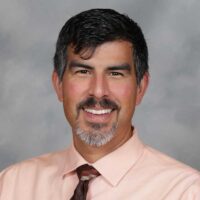 M. Lukas Mendoza, EdD is a high school counselor. He has served schools in Texas, California, and Indiana so far. He is committed to helping students navigate their way through the college and financial aid application process. He believes that access to education is an important component of creating a society that values and respects all of its members. He also believes that we have an incredible responsibility as educators to believe 100% in our students, to shape and influence their critical thinking skills, and respect the dignity they have as humans. When he is not striving for educational excellence, he enjoys consuming Star Wars and Marvel media, traveling around the world to run marathons, and spending time with his family and cats.
M. Lukas Mendoza, EdD is a high school counselor. He has served schools in Texas, California, and Indiana so far. He is committed to helping students navigate their way through the college and financial aid application process. He believes that access to education is an important component of creating a society that values and respects all of its members. He also believes that we have an incredible responsibility as educators to believe 100% in our students, to shape and influence their critical thinking skills, and respect the dignity they have as humans. When he is not striving for educational excellence, he enjoys consuming Star Wars and Marvel media, traveling around the world to run marathons, and spending time with his family and cats.
 Janessa J. Dunn, EdD is a scholar-practitioner and woman of color who actively uses a hybrid of theoretical and empirical research to develop innovative practices to enroll high-achieving and diverse undergraduate classes. Her overall mission is to decrease the postsecondary access gap for underrepresented students in the U.S. A native of Birmingham, AL, Dr. Dunn graduated from Clay-Chalkville High School and pursued her undergraduate degree in Chemistry at Georgia Southern University in Statesboro, GA. She pursued graduate studies (M.Ed. and Ed.D.) and employment (Assistant Director of Admissions) at Vanderbilt University in Nashville, TN, and later served as Associate Dean of Admissions at Wake Forest University in Winston-Salem, NC. Currently, she serves as Director of Admissions at Skidmore College in Saratoga Springs, NY. Her professional management and leadership experiences include overseeing recruitment, application review, yield programming, and retention efforts for students of color, with an emphasis on creating equitable recruitment and file review policies and practices, peer-to-peer relationship building (Tinto, 1993), intentional student leader advising, effective marketing, and strong intra-campus partnerships.
Janessa J. Dunn, EdD is a scholar-practitioner and woman of color who actively uses a hybrid of theoretical and empirical research to develop innovative practices to enroll high-achieving and diverse undergraduate classes. Her overall mission is to decrease the postsecondary access gap for underrepresented students in the U.S. A native of Birmingham, AL, Dr. Dunn graduated from Clay-Chalkville High School and pursued her undergraduate degree in Chemistry at Georgia Southern University in Statesboro, GA. She pursued graduate studies (M.Ed. and Ed.D.) and employment (Assistant Director of Admissions) at Vanderbilt University in Nashville, TN, and later served as Associate Dean of Admissions at Wake Forest University in Winston-Salem, NC. Currently, she serves as Director of Admissions at Skidmore College in Saratoga Springs, NY. Her professional management and leadership experiences include overseeing recruitment, application review, yield programming, and retention efforts for students of color, with an emphasis on creating equitable recruitment and file review policies and practices, peer-to-peer relationship building (Tinto, 1993), intentional student leader advising, effective marketing, and strong intra-campus partnerships.
The college search and application process for students with disabilities is largely like the process for their peers, but it will be informed by the shifts in prevailing law that create differences in the accommodations system, including what supports are and aren’t commonly available. School counselors can use their knowledge to support students in developing needed skills, choosing courses that align with college aspirations, applying for standardized testing accommodations, and choosing colleges that provide a good fit, while also incorporating parent participation in a way that increases student self-advocacy.
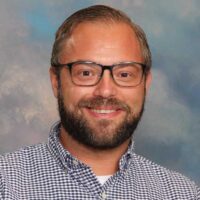 Alexander Morris-Wood is the Vice President of Program Development and Global Partnerships, as well as the Dean of Admissions and the Center for College Readiness at Beacon College (Leesburg, Florida). Alexander has designed and implemented various pre-college programs for students who are neurodiverse and their families to support their adjustment to colleges and universities across the world. Additionally, Alexander leads training programs at state and private colleges, designs tools to support college readiness, and develops curricula for school districts to support transition planning for students who are neurodiverse. Alexander presents nationally and internationally on topics including systemic barriers in higher education for individuals with disabilities and retention management for at-risk students. He is the Co-Chair of the Learning Disabilities Special Interest Group for NACAC, has been identified as one of the Top 100 Educational Leaders in America by the Global Forum for Education and Learning, and is a Board Member of a small private high school in Texas for individuals with learning disabilities.
Alexander Morris-Wood is the Vice President of Program Development and Global Partnerships, as well as the Dean of Admissions and the Center for College Readiness at Beacon College (Leesburg, Florida). Alexander has designed and implemented various pre-college programs for students who are neurodiverse and their families to support their adjustment to colleges and universities across the world. Additionally, Alexander leads training programs at state and private colleges, designs tools to support college readiness, and develops curricula for school districts to support transition planning for students who are neurodiverse. Alexander presents nationally and internationally on topics including systemic barriers in higher education for individuals with disabilities and retention management for at-risk students. He is the Co-Chair of the Learning Disabilities Special Interest Group for NACAC, has been identified as one of the Top 100 Educational Leaders in America by the Global Forum for Education and Learning, and is a Board Member of a small private high school in Texas for individuals with learning disabilities.
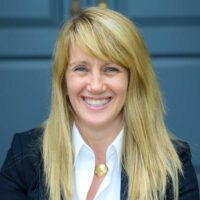 Elizabeth C. Hamblet has worked as a learning disabilities specialist in college disability services offices for two decades. In addition to working at a university, she is a nationally-requested speaker focused on preparing students with disabilities for successful college transition. Hamblet is the author of Seven Steps to College Success: A Pathway for Students with Disabilities and a concise guide on transition, and her work has appeared in numerous journals including Journal of College Admission, American School Counselor, and TEACHING Exceptional Children. She is a contributing writer for Disability Compliance for Higher Education.
Elizabeth C. Hamblet has worked as a learning disabilities specialist in college disability services offices for two decades. In addition to working at a university, she is a nationally-requested speaker focused on preparing students with disabilities for successful college transition. Hamblet is the author of Seven Steps to College Success: A Pathway for Students with Disabilities and a concise guide on transition, and her work has appeared in numerous journals including Journal of College Admission, American School Counselor, and TEACHING Exceptional Children. She is a contributing writer for Disability Compliance for Higher Education.
This chapter provides an overview of postsecondary access and completion for youth who have experienced foster care, highlights a specific program for supporting students from foster care in the college setting, and closes with recommendations and resources for school counselors and college admissions professionals to support this subpopulation in applying to and enrolling in college.
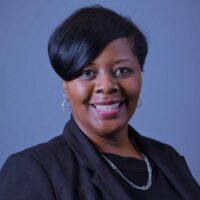 Ronicka Hamilton, MA, LLPC is a native of Kalamazoo, MI, a three-time alum of WMU, and the director of the Seita Scholars Program. Ronicka dedicated her time to developing and growing a local group home for teen girls who were in foster care before joining the Seita Scholars Program early in its creation. She was instrumental in developing and creating the campus coach model, which has trained thousands of professionals around the country since 2013. She was the first Senior Campus Coach for the program, developed the strategy for supervising staff in the area of troubleshooting student challenges and celebrating their successes; she is a senior trainer with the Fostering Success Coaching Institute; and is an associate certified coach through the International Coach Federation. Ronicka is a member of Alpha Kappa Alpha Sorority, Inc. where she dedicates her “spare time” to projects that support and serve the community.
Ronicka Hamilton, MA, LLPC is a native of Kalamazoo, MI, a three-time alum of WMU, and the director of the Seita Scholars Program. Ronicka dedicated her time to developing and growing a local group home for teen girls who were in foster care before joining the Seita Scholars Program early in its creation. She was instrumental in developing and creating the campus coach model, which has trained thousands of professionals around the country since 2013. She was the first Senior Campus Coach for the program, developed the strategy for supervising staff in the area of troubleshooting student challenges and celebrating their successes; she is a senior trainer with the Fostering Success Coaching Institute; and is an associate certified coach through the International Coach Federation. Ronicka is a member of Alpha Kappa Alpha Sorority, Inc. where she dedicates her “spare time” to projects that support and serve the community.
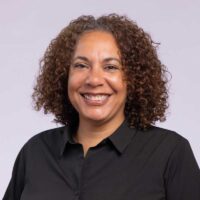 Ramona Meraz Lewis, EdD (she/her) is a master faculty specialist in the Department of Educational Leadership, Research, and Technology in the College of Education and Human Development at Western Michigan University. Dr. Lewis, a proud practitioner-scholar, began her career in higher education as an administrator in both academic and student affairs areas and utilizes that experience to guide her scholarship and current work with students. Dr. Lewis advises and teaches in the Educational Leadership unit, working with both Ph.D., master’s, and undergraduate students. Her work focuses on supporting students in exploring themes of leadership in higher education as well as intercultural development. She is currently the faculty fellow for the WMU Seita Scholars program, a campus-based support program serving students with lived experience in foster care; and she serves as the faculty director of a uniquely designed study abroad course for specifically for the Seita Scholars. She earned an Ed.D. in educational leadership from Eastern Michigan University, an M.A. in College Student Personnel from Bowling Green State University, and a B.A. in English from Arizona State University. Dr. Lewis is an alumna of the State of Michigan King Chavez Parks Future Faculty Fellow program.
Ramona Meraz Lewis, EdD (she/her) is a master faculty specialist in the Department of Educational Leadership, Research, and Technology in the College of Education and Human Development at Western Michigan University. Dr. Lewis, a proud practitioner-scholar, began her career in higher education as an administrator in both academic and student affairs areas and utilizes that experience to guide her scholarship and current work with students. Dr. Lewis advises and teaches in the Educational Leadership unit, working with both Ph.D., master’s, and undergraduate students. Her work focuses on supporting students in exploring themes of leadership in higher education as well as intercultural development. She is currently the faculty fellow for the WMU Seita Scholars program, a campus-based support program serving students with lived experience in foster care; and she serves as the faculty director of a uniquely designed study abroad course for specifically for the Seita Scholars. She earned an Ed.D. in educational leadership from Eastern Michigan University, an M.A. in College Student Personnel from Bowling Green State University, and a B.A. in English from Arizona State University. Dr. Lewis is an alumna of the State of Michigan King Chavez Parks Future Faculty Fellow program.
Not all college-bound students go directly to a baccalaureate-granting institution and stay there for four uninterrupted years. In fact, more than one third of undergraduates transfer between institutions at least once (U. S. Government Accountability Office, 2017). Nearly half of all first-year students begin at a community college with plans to move to a four-year school later (Teachers College, n.d.). Many more students accumulate credits from multiple institutions on the path to degree completion (Katsinas et al., 2019). Counselors who are advising students on postsecondary options must be aware of transfer opportunities and challenges.
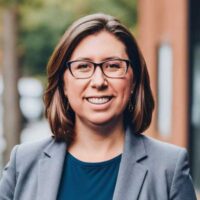 Jaime Smith, MA, MSEd is a Certified Educational Planner with 25 years of experience in the field of education. After many years of teaching English at the middle, high school, and college levels, Jaime turned to online education and founded a virtual supplementary K-12 education program, Online G3, where she continues to teach gifted and twice-exceptional students. As a college advisor, Jaime specializes in transfer admissions, application essays, homeschoolers, neurodiverse learners, and other non-traditional applicants. In 2023, she completed a Post-Master’s Certificate in Transfer Leadership and Practice at the University of North Georgia in collaboration with the National Institute for the Study of Transfer Students, and is a fervent advocate for transfer support.
Jaime Smith, MA, MSEd is a Certified Educational Planner with 25 years of experience in the field of education. After many years of teaching English at the middle, high school, and college levels, Jaime turned to online education and founded a virtual supplementary K-12 education program, Online G3, where she continues to teach gifted and twice-exceptional students. As a college advisor, Jaime specializes in transfer admissions, application essays, homeschoolers, neurodiverse learners, and other non-traditional applicants. In 2023, she completed a Post-Master’s Certificate in Transfer Leadership and Practice at the University of North Georgia in collaboration with the National Institute for the Study of Transfer Students, and is a fervent advocate for transfer support.
This chapter will focus on undocumented students and what school and college counselors should know about the history of immigration policies, contextual roles related to enhancing the work of counselors; and evidence-based practices to inform programs and services dedicated to serving undocumented students. It starts with an overview of undocumented immigrant policy making in higher education and how states have handled the federal government’s denial of access and opportunity to higher education by undocumented students. It concludes with evidence-based scholarship that describes ways college counselors can be helpful to undocumented students’ journey to higher education along with best
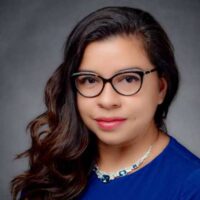 Born and raised in New York City, Blanca Elizabeth Vega, EdD is the daughter of Ecuadorian immigrants. Dr. Vega is an Associate Professor of Higher Education at Montclair State University. She earned a doctorate (Ed.D.) from the Higher and Postsecondary Education program at Teachers College, Columbia University. Dr. Vega’s scholarship broadly focuses on equity, access, and success in higher education among underserved populations. Her primary area of research situates racism as one of multiple barriers that can impact higher education experiences and success – not just for students, but also for administrators and faculty. She was recently awarded a national grant award from the Spencer foundation to explore the experiences of higher education and student affairs professionals and leaders with policies related to undocumented students. Additionally, Dr. Vega was awarded the Channing Briggs Foundation grant from the National Association of Student Personnel Administrators (NASPA) to organize trainings focused on racialized organizational conflict.
Born and raised in New York City, Blanca Elizabeth Vega, EdD is the daughter of Ecuadorian immigrants. Dr. Vega is an Associate Professor of Higher Education at Montclair State University. She earned a doctorate (Ed.D.) from the Higher and Postsecondary Education program at Teachers College, Columbia University. Dr. Vega’s scholarship broadly focuses on equity, access, and success in higher education among underserved populations. Her primary area of research situates racism as one of multiple barriers that can impact higher education experiences and success – not just for students, but also for administrators and faculty. She was recently awarded a national grant award from the Spencer foundation to explore the experiences of higher education and student affairs professionals and leaders with policies related to undocumented students. Additionally, Dr. Vega was awarded the Channing Briggs Foundation grant from the National Association of Student Personnel Administrators (NASPA) to organize trainings focused on racialized organizational conflict.
For Faculty
Highlights
The sixth Edition was re-envisioned to help you prepare the next generation of school counselors! You can expect:
- Faculty support materials including:
- Classroom discussion questions
- Multiple-choice test questions
- PowerPoint chapter summaries to support classroom instruction
- Available upon request from verified faculty only
- Up-to-date content that addresses current issues in college admission counseling
- Exposure to diverse, expert authors representing varied perspectives
- A balance of academic theory and practical application in every chapter
- Alignment with CACREP standards
- Twelve chapters to easily align with typical semester formats
- Consistent and easily digestible chapter length
- Main chapters are 5,000-7,500 words
- Special populations chapters are 1,500-2,000 words
- Consistent chapter format that includes a chapter summary, learning objectives, a case study
- References that comply with APA 7.0
Desk Copy Requests
Only available for faculty teaching a college counseling, or closely related course
NACAC asks that any individual requesting a desk copy of Fundamentals of College Admission Counseling submit an official request via this form.
Eligibility requirements
- Faculty: Name, school, title, email, mailing address
- Course taught
- Name of the program this course is part of
- Is this a required course?
- Semesters?
- Estimated registration?
- Name and address
- Your role at the institution / organization
- When and how they expect to use the book
- Course that they teach (course catalog link or an image in the course catalog listing)
- Estimated course registration
- Link to their faculty Bio on University website or a university email address
- Bookstore name, email address
